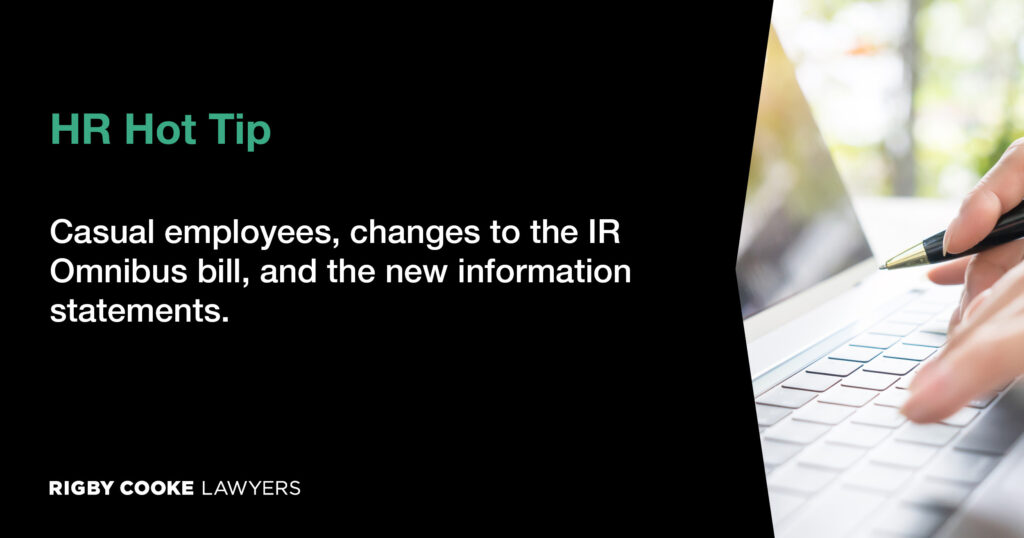Welcome to our series of HR interviews with Workplace Relations Associate Stephanie Shahine, who answers some of the most commonly asked questions by HR managers regarding employees’ legal entitlements and employers’ health and safety requirements.

On 26 March 2021, amendments were made to sections of the Fair Work Act 2009 (FW Act) that relate to casual employees. Employers now need to consider, if I employ casual staff, what are the updated requirements and how do they apply to my business?
The changes to the FW Act came into effect on Saturday 27 March 2021 and included:
- Casual Employment Information Statement
- Fair Work Information Statement
- definition of casual employment
- pathway for casual employees to become permanent full-time or part-time1.
Casual Employment Information Statement
Employers are now required to provide every new casual employee with a copy of the Casual Employment Information Statement2 (the CEIS) prior to or as soon as possible after commencing their new role. The CEIS can be found online via the Fair Work Ombudsman.
Any small business employer will need to provide a copy of the CEIS as soon as possible after 27 March 2021. All other employers should provide their employees with the CEIS as quickly as possible from 27 September 2021.
The CEIS provides detail on the definition of a casual employee and the steps required for employees and employers alike for a casual employee to engage in casual conversion and become a permanent employee.
Definition of a casual employee
The FW Act has been amended to include a new definition of a casual employee.
Employees are considered casual if they accept an offer of employment, knowing that there will be no firm or advanced commitment to ongoing work with an agreed pattern of work. They will continue to be employed on a casual basis until their employment becomes permanent as a result of a casual conversion, being offered and accepting full-time or part-time employment, or their employment ceases.
For more in-depth information on the updated definition of a casual employee, please refer to our previous article here.
Becoming a permanent employee
Please note, now that the 27 September 2021 deadline has passed, all employers need to have assessed whether their existing casuals are eligible to be offered permanent employment.
Employers who have made this assessment and have determined eligibility will need to make a written offer to the employee inviting them to convert their employment to permanent or write to their employee and explain why they are not making this offer.
As indicated above, an entitlement is now included in the National Employment Standards3 for casual employees to become permanent, full-time or part-time employees by way of a ‘casual conversion’ if applicable.
Employees engaged on a casual basis can become permanent by their employer conducting a casual conversion or by making a request to their employer for a casual conversion. Employees who have been employed for 12 months will need to be offered the option to convert to permanent employment.
Fair Work Information Statement
In addition to the CEIS, employers must provide all new employees with a copy of the Fair Work Information Statement (the FWIS) prior to or as soon as possible after commencing their new role.
The FWIS provides new employees with information on their conditions of employment, including:
- National Employment Standards
- the right to request flexible working arrangements
- modern awards
- making agreements under the FW Act
- individual flexibility arrangements
- freedom of association and workplace rights (general protections)
- termination of employment
- right of entry
- the role of the Fair Work Ombudsman and the Fair Work Commission4.
The FWIS can be provided to employees either in person, electronically or via mail.
Employers need to familiarise themselves with and understand their legal obligations to avoid any possible claims by employees (both existing and former), as well as prosecution by the Fair Work Ombudsman or Safe Work Australia.
To ensure your business meets the updated requirements of the FW Act, all employers must provide all staff with a copy of the CEIS and the FWIS. Employment contracts should be reviewed and updated to meet the revised definition of a casual employee and consider whether your employees qualify for casual conversion.
A HR Legal Audit conducted by Rigby Cooke’s Workplace Relations team can provide the HR function and, in turn, provide employers with comfort in knowing that they are legally compliant, or at least provide advance warning of any potential compliancy issues before they become problematic.
1. https://www.fairwork.gov.au/about-us/news-and-media-releases/website-news/reforms
2. https://www.fairwork.gov.au/employee-entitlements/national-employment-standards/casual-employment-information-statement
3. https://www.fairwork.gov.au/employee-entitlements/national-employment-standards
4. https://www.fairwork.gov.au/employee-entitlements/national-employment-standards/fair-work-information-statement
| Disclaimer: This publication contains comments of a general nature only and is provided as an information service. It is not intended to be relied upon as, nor is it a substitute for specific professional advice. No responsibility can be accepted by Rigby Cooke Lawyers or the authors for loss occasioned to any person doing anything as a result of any material in this publication.
Liability limited by a scheme approved under Professional Standards Legislation. ©2021 Rigby Cooke Lawyers |
